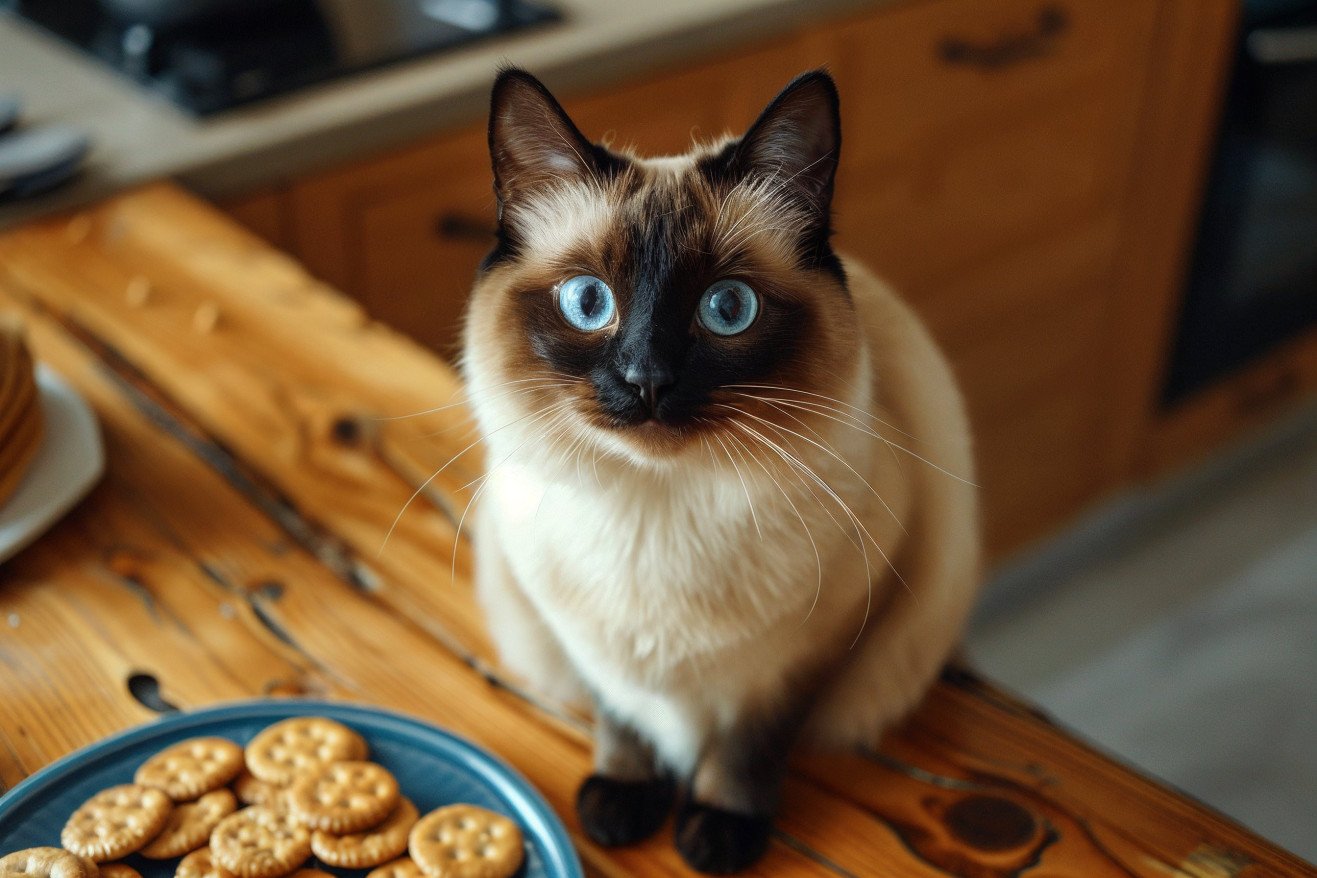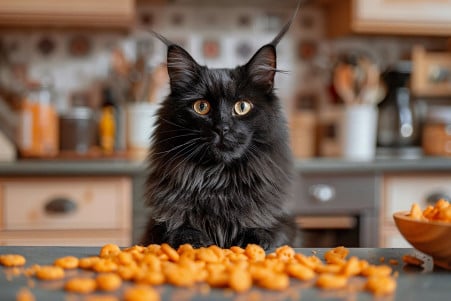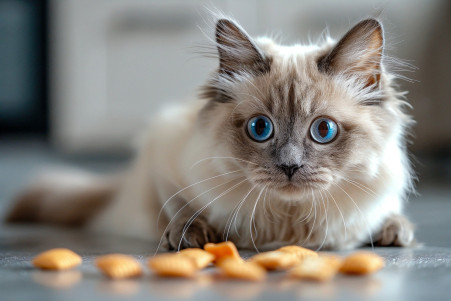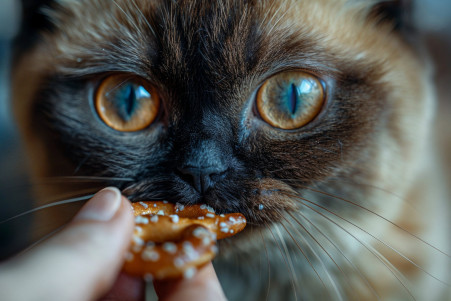Can Cats Eat Crackers? A Vet Weighs In on This Human Food
31 March 2024 • Updated 31 March 2024

Although many human foods may seem like innocent snacks for our furry friends, the question of whether cats can eat crackers is a little more complicated. Crackers are not the best choice for cats because they are high in carbohydrates and contain plant-based ingredients that don't meet the nutritional needs of an obligate carnivore. While small amounts here and there probably won't hurt, cats should not be fed crackers on a regular basis.
To understand the impact of cats eating crackers, we will look at scientific evidence from veterinary nutritionists, research on what cats eat in the wild, and studies of the feline digestive system and nutritional needs. This will help us determine whether or not crackers fit into a cat's natural dietary requirements and whether or not there are any risks or benefits to cats eating them. By the end, you will know everything you need to make an informed decision about giving your cat this human food as an occasional treat.
Can cats eat crackers?
Cats as Obligate Carnivores: What Cats Should Be Eating
Cats are obligate carnivores, which means that their bodies are designed to get the nutrients they need from animal-based proteins and other nutrients. As Preventive Vet explains, a cat's digestive system and metabolism are set up to get the most out of the nutrients in meat. On the other hand, plant-based foods like crackers don't contain the amino acids, vitamins, and minerals that cats need to be healthy.
The carbohydrates in crackers are not only nutritionally void for cats, but they can also lead to weight gain and other health problems. This is why veterinarians, including those at Purina, emphasize the importance of feeding cats a diet that's been formulated to meet their specific nutritional needs as obligate carnivores rather than letting them eat human foods like crackers or bread.
While the occasional small bite may not be immediately harmful, a diet that includes a lot of these foods won't give cats the nutrients they need. To make sure that cats are as healthy as possible for as long as possible, it's important to make sure that they eat a species-appropriate diet that meets their needs as obligate carnivores.
Potential Risks of Feeding Crackers to Cats
Crackers are often high in sodium, which can cause dehydration, increased thirst, and potential kidney issues in cats, according to Hill's Pet. In addition, some of the ingredients found in crackers, including onions, garlic, and chives, are toxic to cats and can cause gastrointestinal distress and even organ failure, per RAWZ.
The high carbohydrate content of crackers can lead to obesity and related health problems, such as diabetes, in cats, according to Daily Paws. In addition, preservatives and additives in crackers can cause allergic reactions and other digestive issues. Finally, feeding cats human food like crackers can disrupt their balanced, species-appropriate diet and lead to nutritional imbalances.
Given these potential risks, it's important to avoid making crackers a regular part of a cat's diet. Instead, the next section will cover some healthier, safer alternatives that are more in line with a cat's natural dietary needs.
Better Options Than Crackers for Treating Your Cat
Instead of crackers, veterinarians recommend giving cats treats that are high in protein and formulated to meet their carnivorous dietary needs. Hepper recommends small amounts of cooked, unseasoned chicken or turkey as a healthier occasional treat for cats. If you're looking for a treat to give a cat with an upset stomach, Daily Paws suggests organic, unsweetened pumpkin puree, which can help soothe the digestive system.
No matter what treat you give your cat, make sure to provide plenty of fresh water to help with hydration, especially if your cat has eaten something salty or high in carbohydrates. Catster also notes that you should always talk to your vet before introducing a new food or treat into your cat's diet, especially if your cat has a health condition that requires a special diet.
More Human Foods That Cats Shouldn't Eat
In addition to crackers, there are several other human foods that can be toxic or harmful to cats. RAWZ lists some of the most dangerous human foods for cats as chocolate, onions, garlic, and grapes or raisins. Chocolate contains methylxanthines that can cause vomiting, seizures, and even cardiac failure in cats, while onions, garlic, and chives can damage a cat's red blood cells and cause anemia. Grapes and raisins are also known to cause kidney failure in cats.
Raw meat, fish, and eggs are also dangerous because they can be contaminated with bacteria like Salmonella and E. coli, which can cause food poisoning, according to WebMD. Dairy products, including milk and cheese, are another common cat hazard because many cats are lactose intolerant and can get an upset stomach from consuming them. Alcohol, caffeine, and the artificial sweetener xylitol are also poisonous to cats and should be avoided at all costs.
In general, to keep your cat safe and healthy, it's best to avoid giving them any human food that isn't specifically formulated to meet a cat's nutritional requirements. The best way to know which treats and snacks are safe and healthy for your cat is to ask your vet.
How to Tell If Your Cat Is Poisoned or in Distress
According to the Pet Poison Helpline, if your cat has eaten a toxic substance, including some human foods, you may notice symptoms like vomiting, diarrhea, lethargy, and loss of appetite. More serious symptoms that require immediate veterinary care include seizures, difficulty breathing, and loss of consciousness, per WagWalking.
After your cat has eaten something new, it's important to watch them for any changes in their behavior or health. According to Daily Paws, many of these symptoms can also be caused by a minor illness or other serious issues, so you should contact your vet if your cat's symptoms don't go away.
If you think your cat has been poisoned, call your vet or the ASPCA Animal Poison Control Center immediately for help. According to Daily Paws, getting medical help quickly can help prevent serious issues or even save your cat's life if they've been poisoned.
Conclusion: Meeting a Cat's Nutritional Requirements
Although a few plain crackers are unlikely to be toxic, they are not something you should feed your cat on a regular basis. Cats are obligate carnivores, and they need a diet that is high in animal-based proteins and other nutrients. Feeding cats human foods like crackers can cause a range of problems, including digestive upset, weight issues, and nutritional deficiencies.
It's important to make sure you are meeting your cat's needs for a species-appropriate diet and not feeding them human foods that are nutritionally inadequate on a regular basis. Talk to your vet about the best treats or snacks that you can give your cat in moderation that are safe and healthy.


